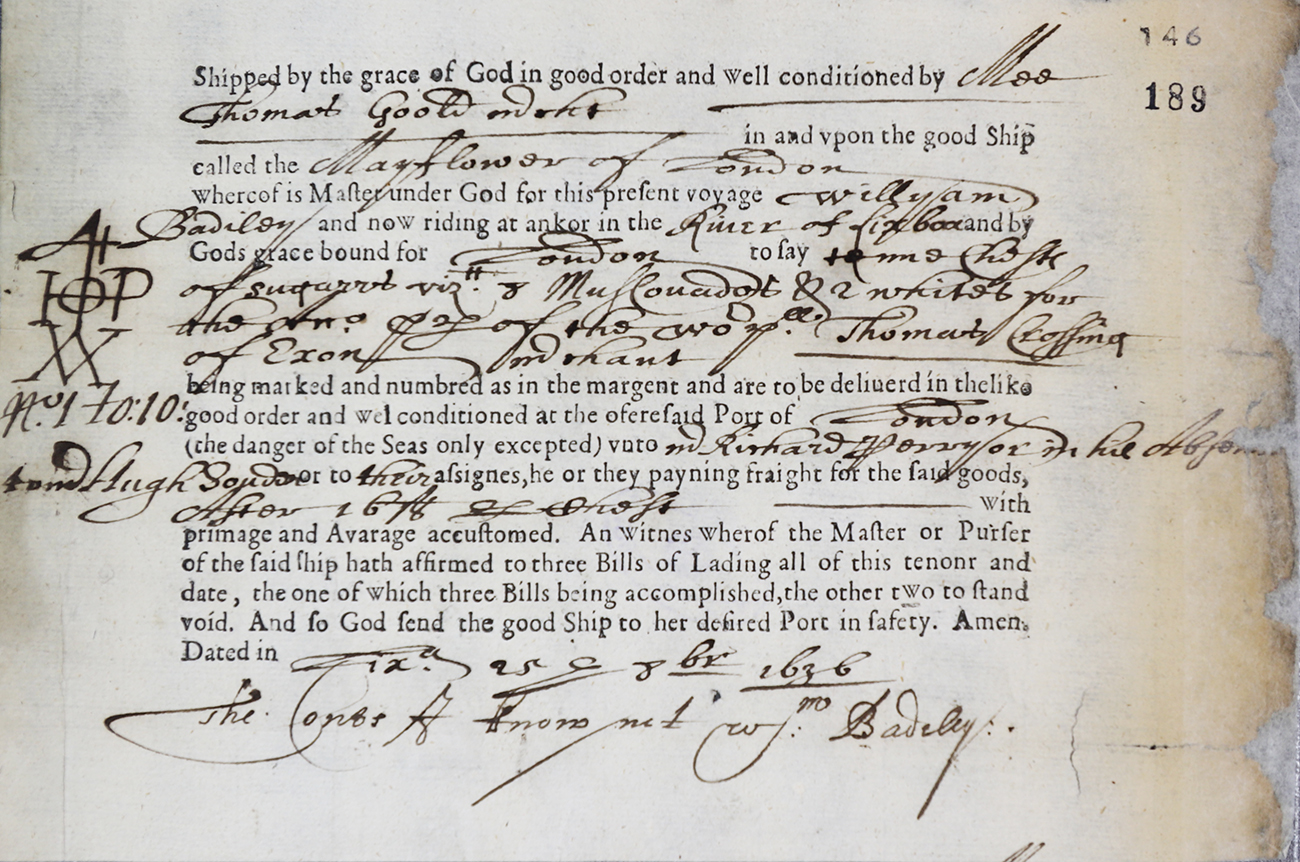
‘Bill of Lading’ for sugar for Thomas Crossing in the Mayflower of London (Master William Badeley), Oct 6. 1636. Catalogue Ref: HCA 30/840/79 f.189.
A ‘Bill of Lading’ was a receipt given by the master of a merchant ship to the person taking their goods. The master of the ship was responsible for the safe delivery of the goods. It was a way of stopping goods from being stolen and sold on to others.
Transcript
Shipped by the grace of God in good order and well-conditioned by Mee
Thomas Goold merchant
In and vpon the good Ship
called the Mayflower of London
whereof is Master under God for this present voyage Willyam
Badiley and now riding at ankor in the Riuer of Lisboa and by
Gods grace bound for London to say tene Chests
of sugarrs namely Muscouado & 2 whites for
the account present of the worshipfull Thomas Crossing
of Exon merchant
being marked and numbred as in the margent and are to be deliuerd in the like
good order and wel conditioned at the ofersaid Port of London
(the danger of the Seas only excepted) vnto Master Richard Poerry or in his Absense
Hugh Sander or to their assignes, he or they payning fraight for the said goods,
After 16/8 per chest with
primage and Avarage accustomed. An witness wherof the Master or Purser
of the said ship hath affirmed to three Bills of Lading all of this tenont and
date, the one of which three Bills being accomplished, the other two to stand
void. And so God send the good Ship to her desired Port in safety. Amen.
Dated in 1636
The contents I know not William Badeley
Simplified Transcript
The goods shipped are of good quality by me the merchant Thomas Goold in the ship
Called the Mayflower of London, The captain of the ship is called Willliam Badiley. The ship is travelling from the River of Lisbon in Portugal and is going to London. It is carrying ten chests of muscovado sugars and whites which are for Thomas Crossing, a merchant in Exeter. These goods are marked, numbered, and to be delivered in good order to the Port of London (the only exception is the danger of the sea) to Master Richard Perry or Hugh Sander. They will pay for the said goods. The captain of the ship has witnessed and confirmed that there are three Bills of Lading. When one Bill of Lading is fulfilled, the other two will be destroyed. God send the ship to the Port of London in safety. Amen.
Dated in 1636.
The contents I know not William Badeley.
- Can you read any of the real document?
- Can you find the date of the document?
- What is unusual about the way this document looks?
- What is the name of the ship written in the document?
- The ship is carrying two types of sugar called ‘Muscouado’ [muscovado] and ‘white’. Can you find out the difference between these sugars?
- Where is the sugar coming from and going to? Can you spot the place names in this document?
- What can this document tell us about how sugar reached England?
- What countries were important in the sugar trade?
- Look at the symbol on the left of the document. What could this be?
- Why do you think this document was carried on the ship?
